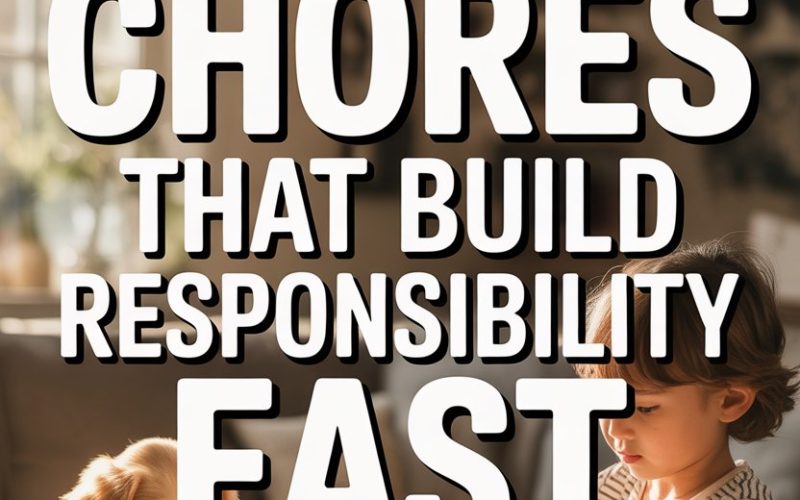Getting kids to pitch in around the house can feel like herding caffeinated kittens.
One moment, you’re enthusiastically handing over the dustpan, the next, you’re watching your small human sweep more crumbs under the fridge than into it.
But here’s the magic: the right chores don’t just lighten your workload—they actually grow responsibility at warp speed.
1. Feed the Pets (and Keep Them Alive)
If you’re blessed with a dog, cat, or even an unreasonably moody fish, you’ve got a built-in responsibility trainer.
Handing over pet care duties is like sneaking veggies into spaghetti sauce: kids barely notice the lesson going down, but the benefits are real.
Start simple. For younger children, “pour the kibble in the bowl” is just fine. That’s not just because you want to avoid the Great Aquarium Flood of 2024. Tiny successes add up.
For older kids, the stakes get higher—think monitoring food and water levels, and even reminding you about vet appointments.
What’s the real magic here? Pets are gloriously non-judgemental. Forget to feed the goldfish, and you’ll see the consequences fast (and maybe have to explain the circle of life earlier than planned).
On the flip side, when a child remembers to fill the dog’s water bowl each morning, they get instant feedback: tail wags, sloppy kisses, and the confidence boost of a job well done.
Research suggests children with routine pet care tasks display significantly higher empathy and reliability than those with no animal responsibilities. Just don’t expect your pet rabbit to thank you with a heartfelt speech.
2. Sort, Fold, and Put Away Laundry
Some parents dread laundry day. Others see it as a golden training opportunity wrapped in cotton and static cling.
Sorting and folding clothes is task heaven for pint-sized helpers: there’s color matching, fine motor development, and—if you’re lucky—the magical moment when socks actually find their rightful partners.
Small children can sort laundry by color or owner. School-aged kids can handle folding shirts and, with some trial and error, might even master the mysterious art of fitted sheets.
Teens can take on the whole shebang, right up to running the machine (with appropriate supervision unless you’re hoping for pink underwear).
According to a study on early life skills, kids who contribute to household chores like laundry have better self-regulation and organisation habits later on.
Plus, there’s something downright satisfying about watching your child beam when they see their sock drawer orderly for the first time. (Enjoy that moment. It may not last.)
Pro tip: crank up a silly playlist and make laundry folding a race. Winner gets out of matching all the odd socks.
3. Set and Clear the Table
The dinner table: birthplace of family memories, source of epic spaghetti stains, and—if you play your cards right—a daily opportunity for kids to learn responsibility.
Setting and clearing the table seems simple, but it teaches routines, teamwork, and attention to detail.
Toddlers can hand out napkins or lay out cutlery (blunt ends, please). Older children can master the whole arrangement, making sure everyone has what they need.
Once the meal’s over, it’s time for the real test: scraping plates, ferrying dishes to the sink, and—eventually—trying not to break the “fancy” glasses that only come out for visitors.
A Harvard Grant Study found that children who regularly do chores, like table-setting, grow up to be more independent and successful adults.
That’s a pretty bold payoff for remembering to put out the salt and pepper.
Introduce a rotating schedule or “chore chart” (yes, those can actually work) and let your kids pick a favorite plate or placemat for the week.
Ownership turns a dull task into something they almost—almost—look forward to.
4. Water the Garden or Houseplants
Nothing teaches consistency quite like keeping a green thing alive.
Watering the plants is brilliantly hands-on, with an immediate connection between effort and result. (Or, let’s be honest, between neglect and crispy brown leaves.)
Kids love the responsibility of wielding a watering can.
For little ones, indoor plants are a gentle place to start. Bigger children can be trusted with the garden hose—ideally outside, unless you fancy an indoor pond.
You don’t need a Chelsea Flower Show-worthy garden. Even a line-up of succulents on the windowsill does the trick. Let your child pick a “plant buddy” and check in on it each day.
If you want to up the ante, turn it into a science experiment: which plant grows tallest, fastest, or wildest?
Studies show gardening with children helps them develop perseverance, patience, and positive self-image. And if your little helper accidentally over-waters the cactus—well, that’s just part of the learning curve.
5. Sweep, Vacuum, and Tidy Up
You know the feeling: it’s five minutes before guests arrive, and your lounge looks like a toy shop collided with a snack aisle. Time to bring in the reinforcements.
Handing over simple cleaning jobs builds a sense of shared responsibility—and not just on Saturday mornings. Start small.
Preschoolers can collect toys into bins, while older kids can sweep, vacuum, and even take out the rubbish if you’re feeling brave.
Don’t expect perfection. The point isn’t a spotless house; it’s the sense of ownership.
A recent study on household chores linked consistent participation to stronger executive function and fewer arguments about screen time. Who knew a broom could be so powerful?
Need a trick to get things rolling? Set a timer for five minutes and see how much mess can disappear. Or create a “before and after” photo challenge—kids love a good transformation.
Raising Capable Kids (and Maybe Even Getting to Sit Down)
There’s no magic wand for raising responsible children, but chores come pretty close.
Each task—feeding the tortoise, folding the towels, wrestling with the vacuum—helps your child learn that they matter, that their effort counts, and that the world won’t end if the socks aren’t perfectly paired.
The best part? These responsibilities don’t require a Pinterest-worthy chore chart or Olympic-level patience.
It’s just about starting, sticking with it, and celebrating the tiny wins. With a little guidance (and plenty of good humour), those boring old chores become secret superpowers.
Pour yourself a cuppa, watch your kids proudly feed the cat, and relax—responsibility is catching on, one small job at a time.




